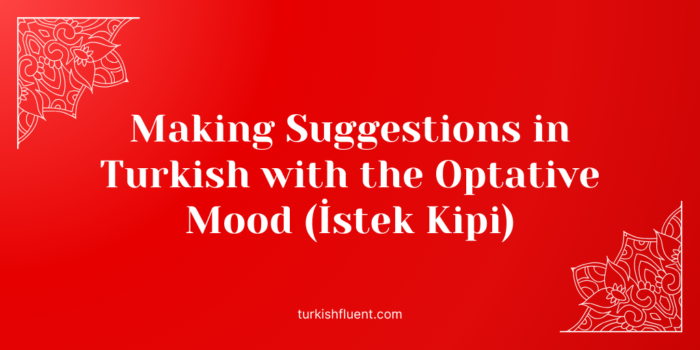The optative mood (istek kipi) in Turkish allows you to express wishes, suggestions, or polite offers. It translates to “Let’s …” in English and is particularly useful in conversational Turkish, where making proposals, seeking approval, or politely expressing desires is common. In this guide, we’ll teach you when and how to use the optative mood in Turkish, along with numerous examples. Haydi, öğrenelim! (Let’s learn!)
Table of Contents
What is the Optative Mood (İstek Kipi)?
The optative mood in Turkish is used primarily with the first-person singular (ben) and first-person plural (biz). It allows speakers to:
- Express personal wishes or offers (Let me…).
- Make suggestions, invitations, or proposals (Let’s…).
How to Form the Optative Mood
The optative mood is formed by adding specific suffixes to the verb root, depending on the subject and vowel harmony.
| Affirmative | Negative | Affirmative Question | Negative Question | |
|---|---|---|---|---|
| Ben (I) | -eyim / -ayım | -meyeyim / -mayayım | -eyim mi? / -ayım mı? | -meyeyim mi? / -mayayım mı? |
| Biz (We) | -elim / -alım | -meyelim / -mayalım | -elim mi? / -alım mı? | -meyelim mi? / -mayalım mı? |
Examples:
- Ben (I):
- Affirmative: Yemek yapayım. (Let me cook.)
- Negative: Yemek yapmayayım. (Let me not cook.)
- Affirmative Question: Yemek yapayım mı? (Shall I cook?)
- Negative Question: Yemek yapmayayım mı? (Shall I not cook?)
- Biz (We):
- Affirmative: Sinemaya gidelim. (Let’s go to the cinema.)
- Negative: Sinemaya gitmeyelim. (Let’s not go to the cinema.)
- Affirmative Question: Sinemaya gidelim mi? (Shall we go to the cinema?)
- Negative Question: Sinemaya gitmeyelim mi? (Shall we not go to the cinema?)
When to Use the Optative Mood – Examples in Everyday Turkish
The optative mood (istek kipi) is versatile and can be used in various contexts in daily Turkish conversations. Let’s dive into its main uses with practical examples:
1. Expressing Personal Wishes or Offers
The optative mood is ideal when you want to politely express what you would like to do or offer assistance.
- Bugün erken kalkayım ve kahvaltıyı hazırlayayım. (Let me wake up early today and prepare breakfast.)
- Misafirlerime annemin tarifiyle baklava yapayım. (Let me make baklava for my guests using my mom’s recipe.)
- Size yardım edeyim. (Let me help you.)
2. Making Suggestions, Invitations, or Proposals
You can use it for group decisions or inviting someone to join an activity. In these cases, the optative mood conveys politeness and inclusivity (it’s not an order with imperative, it’s a suggestion).
- Bu hafta sonu piknik yapalım. (Let’s have a picnic this weekend.)
- Kapalıçarşı’da dolaşalım ve biraz hediyelik eşya alalım. (Let’s stroll through the Grand Bazaar and buy some souvenirs.)
- Akşam sinemaya gidelim mi? (Shall we go to the cinema tonight?)
3. Seeking Opinions or Approval
The optative mood is commonly used in questions to politely ask for advice, feedback, or opinions. These questions often convey uncertainty or a desire to involve others in the decision-making process.
- Bu hafta sonu Kapadokya’ya gidelim mi? (Shall we go to Cappadocia this weekend?)
- Bu elbiseyi alayım mı? (Should I buy this dress?)
- İstanbul’a bu sefer uçakla gitmeyelim mi? (Shall we not fly to Istanbul this time?)
4. Polite Offers
You can also use the optative mood to propose help or assistance in a polite and respectful way.
- Sizi arayayım mı? (Shall I call you?)
- Çantanızı taşıyayım mı? (Shall I carry your bag for you?)
The optative mood is taught in the 20th lesson of the A2 section on TurkishFluent. Check it out!
